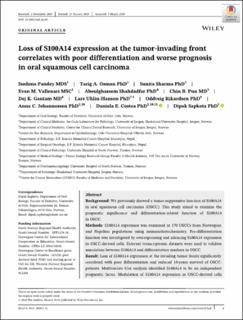Loss of S100A14 expression at the tumor-invading front correlates with poor differentiation and worse prognosis in oral squamous cell carcinoma
Pandey, Sushma; Osman, Tarig Al-Hadi; Sharma, Sunita; Vallenari, Evan Michael; Shahdafar, Aboulghassem; Pun, Chin B.; Gautam, Dej K.; Uhlin-Hansen, Lars; Rikardsen, Oddveig G; Johannessen, Anne Christine; Costea, Daniela Elena; Sapkota, Dipak
Journal article, Peer reviewed
Published version

Åpne
Permanent lenke
https://hdl.handle.net/11250/2733172Utgivelsesdato
2020Metadata
Vis full innførselSamlinger
- Department of Clinical Medicine [2066]
- Registrations from Cristin [9791]
Sammendrag
Background
We previously showed a tumor‐suppressive function of S100A14 in oral squamous cell carcinoma (OSCC). This study aimed to examine the prognostic significance and differentiation‐related function of S100A14 in OSCC.
Methods
S100A14 expression was examined in 170 OSCCs from Norwegian and Nepalese populations using immunohistochemistry. Pro‐differentiation function was investigated by overexpressing and silencing S100A14 expression in OSCC‐derived cells. External transcriptomic datasets were used to validate association between S100A14 and differentiation markers in OSCC.
Result
Loss of S100A14 expression at the invading tumor fronts significantly correlated with poor differentiation and reduced 10‐years survival of OSCC‐patients. Multivariate Cox analysis identified S100A14 to be an independent prognostic factor. Modulation of S100A14 expression in OSCC‐derived cells positively correlated with the expression of differentiation markers. Analysis of external datasets supported the pro‐differentiation function of S100A14.
Conclusion
These results indicate that S100A14 is a pro‐differentiation protein and its expression might be useful as a prognostic marker in OSCC.
